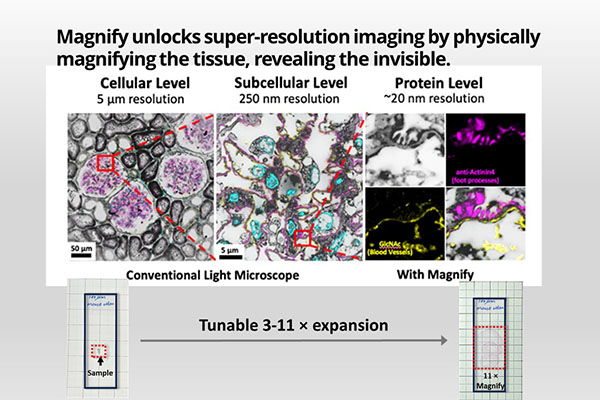
Dr. Yongxin (Leon) Zhao
Associate Professor, Biomedical Engineering and Biological Sciences
- 202A Mellon Institute
- 412 268 8236
202A Mellon Institute
Carnegie Mellon University
4400 Fifth Avenue
Pittsburgh, PA 15213
Education
- B.S., Sun Yat-Sen University, 2009
- Ph.D., University of Alberta, 2014
- Postdoctoral Research, University of Alberta, 2014
Bio
Dr. Zhao is an interdisciplinary scientist and engineer with significant contributions in protein engineering, neuroscience, chemistry, and optics. His development of the GECO calcium ion indicators (Science 2011) and QuasAr voltage indicators (Nature Methods 2014; Nature Communications 2014) has become fundamental in neurobiology labs globally. Zhao has also led advancements in imaging with Expansion Microscopy, enhancing nanoscale imaging for biological specimens (Nature Biotechnology 2017, 2023; Nature Protocols 2020; Advanced Science 2022, 2023), and pioneered reverse applications in nanofabrication for biomedical uses (Science 2022).
At Carnegie Mellon University (CMU), Zhao heads a research group focusing on tools for understanding biological systems at the biomolecular level, including developing spatial profiling tools for biomarkers and computational methods like deep learning for data analysis. His work aims to introduce novel diagnostic methods. Zhao's collaborations span various fields and international borders, aiming to democratize advanced technologies for worldwide research labs. Zhao has received numerous accolades, including the NIH Director's New Innovator Award. His lab is supported by the NIH, NSF, DoD, the DSF Charitable Foundation, the Kaufman Foundation, and the Pennsylvania Department of Health.
Research
Our lab combines diverse bioengineering and chemical approaches to develop novel techniques for understanding biological and pathological processes. Our goal is to create new diagnostic and therapeutic approaches for complex diseases.
We're developing innovative tools for mapping the structural and molecular properties of complex biological systems. Using expansion microscopy (ExM), we expand biological samples physically to visualize them with nanoscale precision. This technology helps us gain insights into the brain, cancer, and infectious diseases.
Additionally, we're creating tools to probe the dynamics of biological processes. Our innovations allow us to observe cell populations and subcellular signaling events with molecular precision. These tools help us understand how biological components function and interact, both in health and disease.
Research Interests: bioengineering, cell and tissue engineering, diagnostic and therapeutic, expansion microscopy, nanoscale.
Awards and Recognitions
-
NIH Director's New Innovator Award, 2018-2023
- MIT Translational Fellow, 2015-2016
-
Governor General Academic Gold Medal, 2014
- University of Alberta Faculty of Science Dissertation Award, 2014
